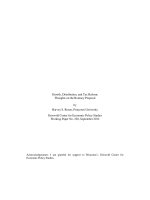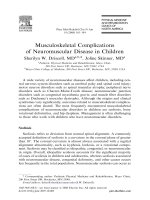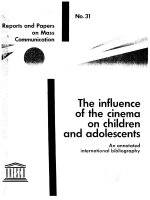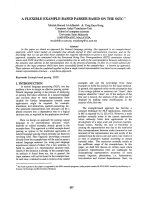Thoughts on children pot
Bạn đang xem bản rút gọn của tài liệu. Xem và tải ngay bản đầy đủ của tài liệu tại đây (322.23 KB, 85 trang )
r
Thoughts on
Children
•
Christoph F. Blumhardt
Johann C. Blumhardt
Thoughts on Children
Johann Christoph Blumhardt
Christoph Friedrich Blumhardt
The Plough Publishing House
Please share a link to this e-book with your friends. Feel free to post and
share links to this e-book, or you may e-mail or print this book in its
entirety or in part, but please do not alter it in any way, and please do
not post or oer copies of this e-book for download on another website
or through another Internet-based download service. If you wish to
make multiple hard copies for wider distribution, or to reprint portions
in a newsletter or periodical, please observe the following restrictions:
• Youmaynotreproduceitforcommercialgain.
• Youmustincludethiscreditline:“Copyright2012by
The Plough Publishing House. Used with permission.”
This e-book is a publication of The Plough Publishing House,
Rifton,NYandRobertsbridge,England,www.plough.com.
©2012byThePloughPublishingHouse
All rights reserved.
Isbn: 978-0-87486-934-7
The material in this book has been translated from the German,
compiled from various sources. For bibliographic details, see the
endnotes.
Front cover image: Interior with Women and a Child [detail] (oil on
canvas),Mathey,Paul(1844–1929)/Museed’Orsay,Paris,France/
Giraudon/TheBridgemanArtLibrary
Contents
Foreword vii
A B C
YoungChildren 1
OlderChildren 27
J C
The Twelve-year-old Jesus in the Temple 39
The Savior and Children 45
LettheChildrenCometoMe 59
Endnotes 69
Foreword
I
t is sometimes said that each child is a thought in
the mind of God. But even if we believe this, and
approach the children entrusted to us with the
reverence that such a belief ought to instill, we
mayoftenfeelhelpless–whetherinthefaceofa
two-year-old’stantrum,orateenager’ssilence.
In this little book, two fathers (themselves
a father and son) share their thoughts on the
essence of bringing up children. Both lived in
Germany in an era when parents and teachers
tended to be overly strict, and we live in a time
when they tend to be very lenient. All the same,
there is plenty in what they say that is timeless.
JohannChristophBlumhardt(1805–1880)
studied theology in Tübingen and became a
pastor. He longed to experience the reality of
vi
God, and this he did in a very concrete way when
he dared to take up an intense two-year battle
(1842–44)withthedemonicpowersthatpossessed
a tormented woman in his congregation at
Möttlingen. As in New Testament times, demons
were driven out, and the woman was cured. And
all over Germany, Möttlingen became known for
themottothatexpresseditsinhabitants’joy:Jesus
is victor!
In the following months, a movement of repent-
ance and conversion spread far beyond his parish,
and many other people were healed of physical
illnesses.Somanycametohimthatin1852hefelt
he had to leave Möttlingen, where he had worked
withhiswifeforfourteenyears(1838–1852),and
move to the large and imposing spa at Bad Boll.
As housefather there, he was able to continue his
growing work of caring for the thousands that
cametohim–sick,wounded,andsin-ladensouls.
In1920A.Albers,awriterforawell-known
publishinghouse,describedthefatherBlumhardt’s
life in these few telling words:
vii
The atmosphere in which this Swabian pastor
lived with unwavering certainty was that of
early Christianity and the expectation of the
nal breaking in of the kingdom of God. This is
where he drew his strength. In this atmosphere
he helped the people of Möttlingen and Bad Boll,
who turned to him day and night. His life was
one uninterrupted exercise of the powers of love.
Here was a man who had a part in what God was
doing and who was an instrument in his hands.
1
JohannChristophBlumhardt’ssonChristoph
Friedrich(1842–1919)wasraisedinthisatmosphere
of expectation and the reality of the presence of
God. He too studied theology at Tübingen, and
thenreturnedtoBadBollin1869tohelphisfather.
In1880theelderBlumhardtdied,andhisson
carriedonhisfather’spastoratewithsimilargifts.
Hefollowedsotrulyinhisfather’sfootstepsthat
the witness they gave to Jesus and the kingdom of
God was one and the same.
Christoph Friedrich saw that Christians were
turningthebiblicalexpectationofGod’skingdom
on this earth into a waiting for their personal
viii
reward in heaven. He took a sharp stand against
thisreligiousegoismandproclaimedGod’slove
for the whole world. He saw that healing for its
own sake was another great danger threatening
the true surrender to the will of God, and there-
fore he eventually gave up healing the sick. In a
letterhewrote,“Donotlookatyourselvesand
allyoursuering.LookatthesueringofGod,
whose kingdom has been held up for so long
because of the lying spirit of men.”
The atmosphere in the household at Bad Boll
isdescribedbyaguestwhovisitedin1852,shortly
after the father Blumhardt had moved there with
his family:
Aspiritoffreshnessandjoyblowsthroughthis
house, a spirit that gives a vivid impression of
what the peace of God is all about, the peace that
surpasses all understanding. It pervades every-
thing, practical and spiritual, signicant or insig-
nicant. This atmosphere aects the soul as fresh
mountain air aects the body.
2
What a place for children! Here is an anecdote told
by this same visitor:
ix
Oneeveningtherewasawomanatsupperwith
her little four-year-old daughter. She was sitting
nearBlumhardt,andthechildwasjustbehinda
pillar. Blumhardt had sent someone to fetch the
Bible, as we were waiting for the evening reading
to begin. Suddenly, when everything was quiet,
Blumhardt’svoicewasheard:“Peek-a-boo!Peek-
a-boo!” And so he had fun with the child for a
while.Thenhebrokeo,saying,“So,nowbenice
and quiet, like a good little girl. We left o at the
secondhalfofthesecondchapteroftheLetterto
theEphesians”–whichheproceededtoread.
3
In his biography of Johann Christoph Blumhardt,
Friedrich Zündel tells the following story, which
alsoillustratesBlumhardt’sgreatunderstanding
for children and young people:
Now about that dicult age for boys, the
“terribleteens”sofearedbymanyeducatorsfor
its thorns and thistles. Blumhardt found the right
way, especially with boys whose hearts were lled
with bitterness and confusion, possibly owing to
an excessively strict and pious upbringing.
x
Onesuchboycomplainedthathehadhadto
putupwithtoomuchreligiousinstruction.On
the whole he felt quite happy in the free atmos-
phereofBlumhardt’shouse,buthewasstill
capableofplayingallsortsoftricks.Oneday
amaidcamestormingintoBlumhardt’sroom:
“PastorBlumhardt,nowhewentandstolethe
eggs from the hen house and put this hymnal
there instead!” What did Blumhardt do? He said,
“Therascalhidingintheboy’sheartisalsohiding
inyours.Andbehindyouranger,aren’tyoureally
enjoyingittoo?Wemustovercometheboy’s
mischief in our own hearts. Just put the hymnal
backinthehenhouse.Anddon’tmakeanything
of it.”
He told the others also to put things back as
they had found them. For a long time the boy
was in suspense, waiting, not without a certain
impish glee, for the blowup he was sure would
follow. When he realized that nobody was going
to take any notice, he gave up his nonsense. The
hymnal was probably ruined. But to Blumhardt, a
boy was worth more.
4
xi
The father Blumhardt had eight children of his
own. He wanted them to grow up under the inu-
ence of the spirit that ruled in his house. So he
taught his boys at home with the help of a tutor
until they were fteen or sixteen years old. How
much time and eort that must have cost him!
But he was indeed rewarded when later four of
the ve children that lived to grow up and marry
worked with him at Bad Boll or close to him in a
neighboring village. In time he was blessed with
manygrandchildren–morethantwentylivingat
Bad Boll. His son Christoph Friedrich had eleven
children.
Zündel describes how the father, Johann
Christoph Blumhardt, gathered his children and
grandchildreneachmorningaboutseveno’clock,
before breakfast, for prayer and singing:
Blumhardt’sbigfamilygatheredinalargeroom
for devotions. They were especially for the chil-
dren, twenty-four of his own grandchildren as
well as other children who had become part of
the family. Here Blumhardt was happy. I think
he looked upon these children as his bodyguard,
xii
his picked troops, and he believed in their pure,
simple trust in God and what God wants to
bring. He prayed with them as a child among
children–notasonestoopingtotheirlevel,but
straightandsimple–afruitofchildliketrust.
When the group of parents and children were
gathered, Blumhardt would come in, sit down,
ring for silence with his little bell, and say a
prayer.Thenthosegatheredwouldsing,“May
theLordblessus,”andtowardtheendofthe
song all the children would start wriggling.
As soon as the last note died away, all those
big enough to walk would start toddling up to
Grandfather. The mothers would follow, carrying
their babies, and then came the older children.
Blumhardt would put his hand on each child,
saying,“MaytheLordblessyou!”andsoon
down the line.
Ofcoursewhentherewasaspecialreason,
for instance if a child was sick or had a birthday,
he would say a few words in addition to this
short blessing. The meeting would close with
another song. All these songs were sung to tunes
that Blumhardt had composed, and the tiniest
xiii
totwouldjoininlustily,withoutbeingtheleast
disturbance.
5
It was during these years, when Johann Christoph
Blumhardt was a grandfather in his seventies, that
most of the excerpts in the rst part of this book
were written. At this time he published a weekly
letter for his many friends, and here he took time
to answer questions and write down some of
his thoughts on children. In these letters he asks
parents, teachers, and adults in general to respect a
child’splayandinnocentjoyandnottodisturbthe
child or pester him with grown-up formalities. He
even warns us not to oend the angels that accom-
pany a small child. All this he writes with such
directness, even bluntness, using down-to-earth
Swabian colloquialisms, that it is hard to reproduce
hiswordsinEnglish.
EarlyinhislifethefatherBlumhardthadbeen
moved by the tenderness of Christ. He wrote to
hisancée,DorisKöllner:
This I want to learn, and I need you to help me. It
is this gentleness in Jesus that attracted people to
xiv
him; this is what he called people to. At the same
time this gentleness becomes an important tool
for the pastor in his handling of sinners. I mean,
ofcourse,notjusttheoutergentleness,butthe
hidden, inner tenderness that enables us to feel
and think in a tender way.
6
This heart-warming tenderness went out to chil-
dren and to parents, especially to parents of sick
children or to those who had lost a child. He and
his wife had also lost two children who lived less
than a day and one who died under two years old.
Tenderness and love for children can be strongly
felt in the second part of the book, which is made
upofextractsfromsermonsonthesubjectof
children by both father and son Blumhardt.
It is with gratitude for the lives of these two
powerful witnesses for the childlike spirit of the
kingdom of God that we publish this little book.
A B C
YoungerChildren
From a letter: When my children have been
naughty and disobedient, I make it a rule to get
themtoasktheirfather’sforgiveness.Thisisvery
easy for some, and soon they do it quite on their
own; but for the others it often costs an inner
struggle and considerable strictness before they
can be persuaded to do it.
Answer: This rule of yours with your children is
quite untting and wrong, and you could ruin them
with this rigid, moralistic treatment. More often
than not, so-called naughtiness and dis obedience
in children is quite unpremeditated, so that they
have no inner feeling of something wrong; they
cannot understand what all the fuss is about. Adults
so easily call something naughty and disobedient
even when this is not the case.
2
Children are often ordered about too much or
in haste; they are hardly able to take in what is
expected of them. After all, they are also beings
who should be respected. So it is not at all right
to make such a big crime out of everything and
demand that even the father, who had not been
present, should be asked for forgiveness. It is
understandable that there is trouble then. But that
is by no means all. Many reproaches, then stern-
ness, then scolding, and the children become more
and more confused. In the end it leads to great
severity and harsh punishment.
Dearmothers,don’tdothis!Thisway,allthat
is childlike and unselfconscious in the children
is destroyed, and their endearing ways are taken
from them. In regard to anything we ask of little
children, it would be a good rule to drop our
demands when the children do not respond well
because they are not far enough along in their
development.
From a letter: My daughter, an adopted child,
has been indescribably naughty in the last few
3
weeks–snitchingcandy,tellinglies,beingcontrary
and surprisingly rude to grown-ups, more than
ever before. To me the child was not rude but
would give no answer at all when I asked her a
question. She chews her nails, her face twitches,
and her eyes take on a glassy look; and in the end
her whole face sets in a strangely old and hopeless
expression. I believe that even if it cost her her life,
she would not answer at such moments.
Answer: We should be very careful how we treat
this. Severity is the worst thing. Best of all in such
conditions is to do almost nothing until the child
has come to herself, so to speak. This state often
comes about because a child has not been left in
peace–hersoulhasnotbeenallowedtobreathe
freely because someone has been forever occu-
pied with her, especially when several people
are helping. Naughtiness comes from that too.
Never question a child who is in this state you
describe.Evenfriendlinessgetsherexcited,and
every demand on her makes it worse. So please
stop asking questions straightaway as soon as no
answers come, and do not insist on an answer.
4
In bringing up children, it should be kept very
much in mind that it is good to stop and think as
soon as any child does not seem to get on well or
makes us uneasy. If ever we are driven to prayer, it
isincasessuchasthese.YoushouldturntoGod,
and I too will think of your child in prayer.
As many people have urged me to say more about
bringing up children, I will at last do something
about it and write a little more. I did not do so until
now because I did not know where to begin; and
there is so much I would like to say that I would
hardly know where to stop. I was also waiting for
questions that would lead to a specic theme, and
I would still like to ask for questions. But as none
have come, I will write as it comes to me at the
moment. There is no lack of opportunity for expe-
rience in my house as there are numerous grand-
children growing up all around me.
It is particularly important that the merry,
contented,andjoyfuldispositionof one-,two-,
and three-year-olds is not disturbed, and in order
not to disturb it, those in charge of them must
5
continually exercise self-denial in the broadest
sense.Butjustinthisareathegreatestmistakes
are made. With countless children things soon
go wrong, and then later very wrong, because their
happy disposition in early childhood has not been
treated with consideration and reverence. Instead,
it has been interfered with again and again in all
kinds of seemingly insignicant ways.
Therefore my rst request is to refrain from
doing anything that tends to make a child unhappy
and that tears him away from his thoughts, or at
least to consider it carefully; for you could very
easily do dierently. A child always thinks for
himself and in his own way. His eyes see all that
is around him, and everything occupies his mind
andurgeshimtodothingswithinnerjoyand
delight, quite innocently. He needs full scope to
let his own thoughts work and to notice things
for himself. That is his rst school; he is really
teachinghimself.Onegetsthefeelingthatangels
are around the children, leading and teaching
them, and whoever is so clumsy as to disturb a
child opposes his angel.
6
Most of the disturbances a child has to put up
with come about because everyone who sees or
passes by him quickly has to pick him up and hold
him, kiss him, or do something or other with him.
Oneafteranothermaycomealonganddothe
samething.Butjustatthatmomentthisisnot
what the child wants, and every child struggles
against it, against everyone, even against those he
loves most. Then when he struggles, he is held
byforceandtold,“Youdon’tloveme.”Thechild
becomes more and more unmanageable, instinc-
tively hits out, and begins to cry. Then he is told,
“Youaresonaughtyandobstinate!”
Now the complaining begins: the child is self-
willed, and the clever advice is given that he must
be brought up better and his self-will must be
broken, otherwise he will become completely
spoiled. So it goes, on and on. The one whose
feelings have been hurt gives him a smack, and
with holy (or rather unholy) zeal the stick is even
resorted to and the poor little mite has to feel it.
But who is naughty? Who is self-willed?
The result of it all is that the child is robbed of
his sunny disposition, and if it continues, he grad-
ually becomes deant and unbearable. His own
personality has not been respected; others have
imposed their personality on his. No wonder many
other problems arise in bringing him up!
It is important not to disturb the happy dis-
position of children, especially of small children,
because otherwise the natural development of
their characters will be ruined. I want to say more
about this.
Achild,asalreadymentioned,objectstobeing
picked up by everyone he meets and having to
submit unwillingly to all kinds of fondling and
caressing.Otherpeople,eveniftheyarenearrela-
tives, should leave the child free and not even
demand a handshake when the child is busy
with something else and does not come of his
ownaccord.Yetoftenwhenachildcomesintoa
roomful of people, he is expected to shake hands
with each one, perhaps even to say good-day as
well,andeventoboworcurtsey.“What?”theysay
tothechild,“Don’tyouknowyourmanners?Go
and shake hands,” and so on.
We should remember, though, what a burden
such demands are on the child. He is expected to
be outgoing and concern himself with nothing
else, to touch nothing, and turn neither right nor
left until he has managed to perform what good
manners demand of him, while all the time he
longs to do all sorts of other things. Before he
knows it, he gets a sharp rebuke, then there is a
row, and gone is his happiness. Then maybe on
top of it comes the problem of the left hand;
what trouble is taken to make him give the
proper hand, and how much the child has to listen
to, while, in confusion and already a bit bad-
tempered, he keeps on oering the left hand.
How quickly we mar our relationship with a
child over quite unimportant things, things we
shouldreallynotbotherhimwith.Wejustdo
notputourselvesinthechild’sshoesandseehis
needs and innocent wishes. I would like to make
an urgent plea once more to all educators always
to watch out that the happy nature of a child is
protected and that everything that annoys him is
done away with. When he is left undisturbed and
happy, he learns obedience best of all; then he
becomes trusting, and quiet and relaxed, and you
can almost see his understanding grow because
he is given time to notice things and think about
them. When people annoy him and continually
correct and criticize him, he becomes rebellious,
turnstothebad,andhardenshisheart.Youcan
even drive him insane.
10
Alittlemoreonthesamesubject,andthenwe
can leave it for a while: we often spoil the happy,
cheerful nature of children and their childlike
contentedness by our habit of making them wait.
We always have to get everything done, nish
every detail, or at least knit one more row, before
satisfyingachild’swishorneedorpleasinghim.
When the children become restless because we
don’tkeepourpromisesandgivethemthejoyof
doing what they ask for in all innocence, we call
out,“WaitaminutetillI’vegotthisnished.”The
10
child begs, but one more row must be knitted, a
letter must be read or written, and who knows
what else has to be done that puts it o longer. We
snapatthechild,“Waitabit!Can’tyouwaitabit?”
The child begs all the more persistently and tear-
fully,untilwesay,“Can’tyouleavemeinpeace?
Youmustlearntowait.”
Now the child breaks out crying, sobbing,
andwailing.Andthen:“Younaughtychild,now
you’llcertainlynotgetwhatyouwant!”The
child is snatched up and taken o. The poor little
mite can be heard crying all over the house. This
often happens in the nursery. There is an ever-
lastingcryingandwailing,andwhy?Oh,thistire-
some procrastination in all the things we owe our
children! Between the wails come the impatient
words,“Younaughtychild.Youwillfulchild!Wait,
you’llgetagoodsmack,”andifitgetsworseyou
can hear the stick or the rod or a smack. That
really is asking for trouble later.
It is especially important not to make the chil-
dren wait at table. They simply are not able to wait
a long time when they are hungry; and to make
11
them wait can become torture for them. We see
this clearly in little children. They get so ravenous
that they begin to drool when the mother or the
teacherdoesnothurry.Evenolderchildrenare
often like this, and there is always something
unmercifulaboutmakingachildwait.Oh,howa
child looks forward to something, no matter what,
andinsteadofjoyitfeelsbittersorrowbecauseof
the procrastination of those who have it in their
hands to give!
Recently, my dear friend Pastor Wenger from
Heinrichsbad visited me. It reminded me of how I
wasoncehisfather’sguestinBernfortyyearsago.
He was a teacher there and boarded young school
children. We had a simple midday meal with them.
Thefatherprayedandbegantollthechildren’s
plates from the smallest to the oldest. And to me
hesaid,“Thechildrenmusthavetheirfoodrst
becausetheycan’twait.”“Oh,”Ithoughtatthat
timealready,“that’stherightsortof teacher;he
putshimselfinthechildren’sshoes.”Mostparents
andteachersareinthehabitofsaying,“Children
must wait until the grown-ups are served.” I









